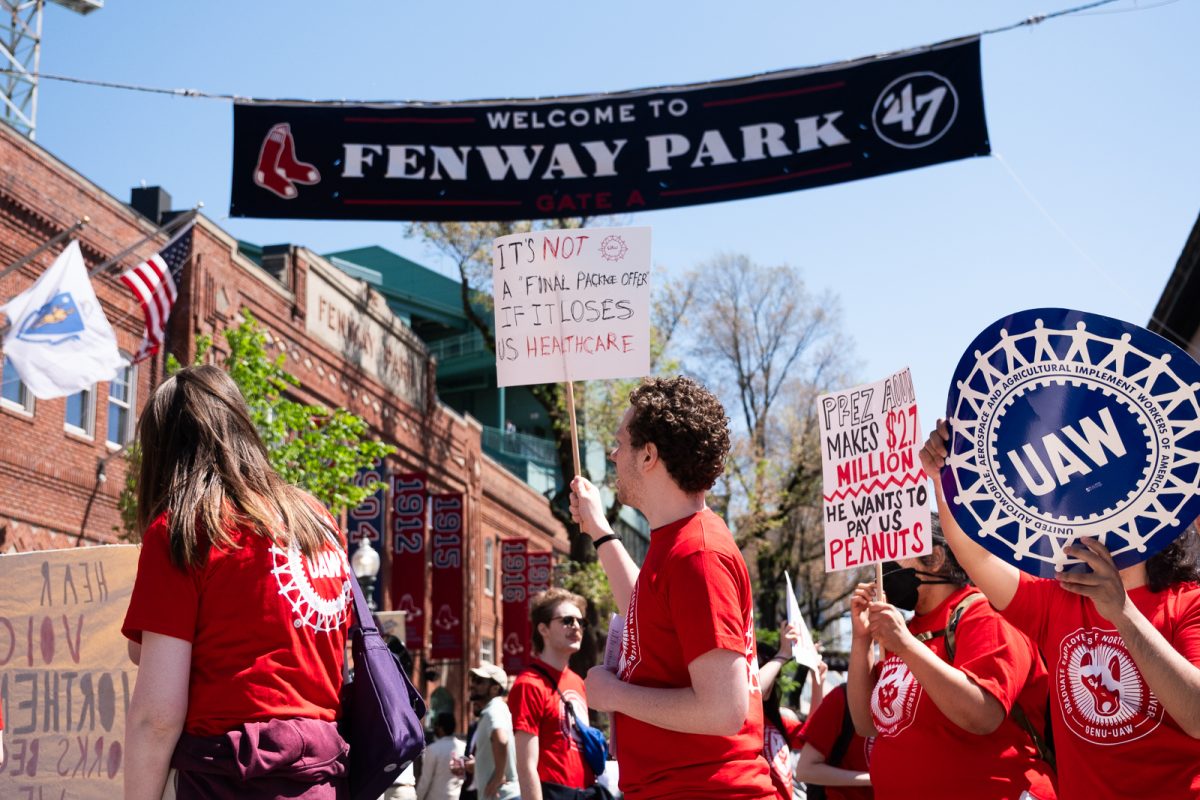By Ricky Thompson
Adam Bard said he knows some students believe that because Boston has an urban atmosphere, the social dependency on college Greek Life is diminished, especially when compared to chapters in the south.
“It’s not as big,” said the sophomore business management major and member of Northeastern’s Pi Kappa Alpha chapter. “In remote areas where there’s nothing going on, there’s a lot more Greek Life involvement for something to do.”
Bard knows this from experience.
He originally rushed for the fraternity during the fall of his freshman year at Florida Atlantic University (FAU) in Boca Raton, Fla., then transferred to Northeastern this fall. Now, Bard serves as the chair for both the community service and risk management boards of his fraternity, which contains about 35 active members at Northeastern.
Despite its greater presence in Florida, Bard said the fraternity’s NU chapter is a “hell of a lot more organized, and a lot more serious” than its southern counterpart.
“I have only two chair positions now and it’s hard to do it because I have so much other [stuff] going on in my life. At FAU, the chair positions were a joke. A lot of times it’d be, ‘community service: nothing to report,’ ‘risk management: nothing to report’ – it was cake to do it. Up here it’s a lot more organized and I love it.”
In either setting, however, Bard said the principles and responsibilities remain consistent. A minimum 2.5 GPA is required for those participating in Pi Kappa Alpha, a number which varies with each fraternity.
In addition, members are obligated to pay dues each semester, which are used to fund events, transportation and insurance.
Greek organizations also play a large role in the area through community service. As chair of the committee, Bard said he tries “to do events that are interesting.”
Bard said his fraternity participates in a fundraising event that involves selling beer at Gillette Stadium. In doing this, Pi Kappa Alpha received a cut of the total gross profits from the Patriots organization, while those who participated were allowed to keep the tips they had earned. The funds raised at the event were used to plan activities and make shirts, Bard said.
“The thing about community service and obligations are that you have to convince people that it’s going toward a good thing or it’s going to be a good thing – you want to have fun at these events,” he said. “Of course everyone’s going to show up to a party or a social, but you just have to motivate them [to be active in the community].”
This week, the fraternity is sponsoring a series of on campus blood drives.
Bard said not only does being a part of a fraternity include providing community service, but also building a solid social network.
“The great thing about a fraternity is that not only do you meet a group of people that all have the same interests as you do – you have friends for life,” Bard said.
In addition, he said fraternities often provide “amazing networking” from one chapter to the next.
“It’s great, too, because you’re going around the country and you’re wearing a [fraternity] shirt and people see you. They go up to you and do the whole password thing and it’s cool to go out with them, have a party or whatever,” he said.
An aspect of fraternity life visibly missing from practically all organizations at the university is a specific house for its members to reside in.
Bard said the fraternity has been considering getting a house for some time, but there are a number of obvious constraints that go along with it.
Assistant Director of Student Activities and Greek Life advisor Laura Parrillo said fraternities are solely responsible for any progress made toward acquiring housing for their organization.
“In order to buy property, [a chapter] would have to go through their national organization, raise funds from alumni, raise funds in order to buy a house,” she said. “And basically, in order to call it a fraternity house, they would need a dormitory license.”
In order to obtain a dormitory license, the applicant must work in conjunction with the city. However, the university is beginning to consider other options to provide close housing for the organizations, Parrillo said.
“It’s not something that is going to happen next semester or anything, but it has come up several times that a couple of other urban campuses … don’t have the luxury of having big sorority or fraternity houses,” Parrillo said. “In the residence halls, they have one floor of one chapter and one floor of another. This allows people from the same chapter to be living together even if it’s not in a ‘house-house.'”
The university may not be ready for Greek housing, Bard said. He feels the organizations predominately have a poor reputation on campus.
“Once an officer sees a guy wearing a fraternity shirt, [he/she assumes] there’s a fraternity event going on – it could be not even a brotherhood event or a [Pi Kappa Alpha] gathering, just different brands of people all hanging out together, but as soon as they see letters, you’re screwed.”
This reputation is one that Bard said he would like to see change.
“You can’t just single us out because we’re a fraternity and all we do is party [because] that’s not true,” he said. “We don’t just go out and party – we do a lot of work.”
Even with a student body that is seemingly independent of the need for Greek involvement, Bard said his fraternity is one he is proud to be a part of.
“It’s not easy, but it’s the best thing you could ever do,” he said. “I wouldn’t be at Northeastern right now if I wasn’t in [Pi Kappa Alpha].”








